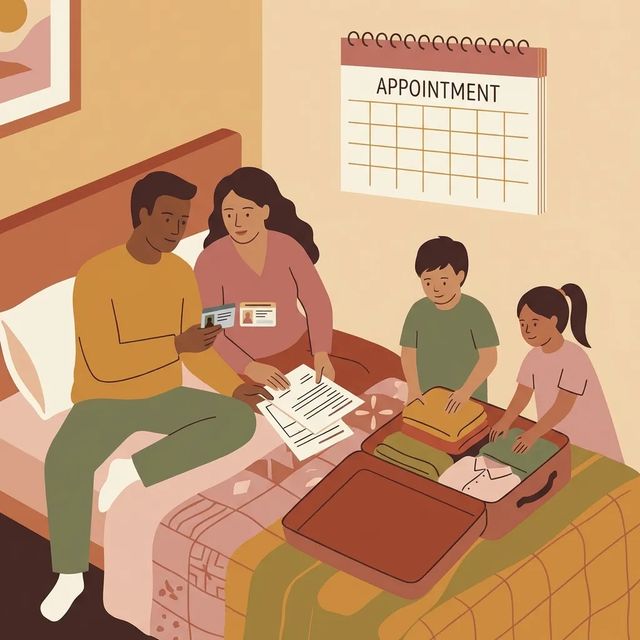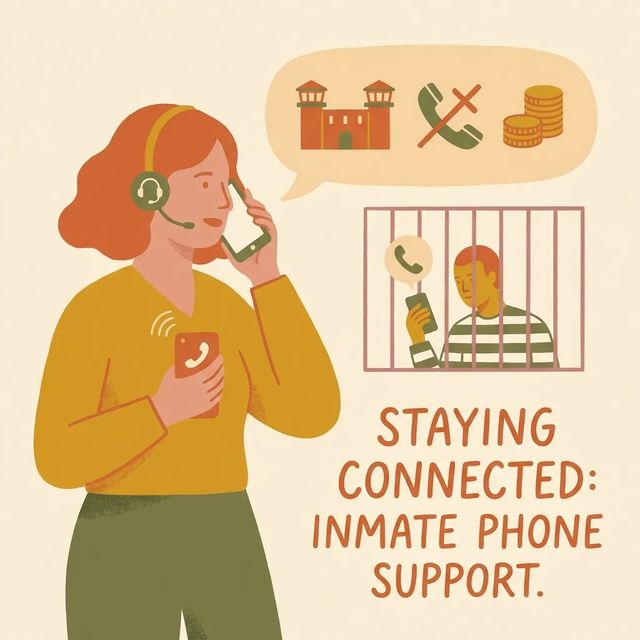Moore County Detention, NC
Need to reach someone at Moore County Detention? Look up an inmate, send messages or mail, add commissary funds, or schedule a visit.
Explore
Find an Inmate at Moore County Detention, NC
Search for a loved one and send messages and photos in minutes.

Guides for This Facility

How to Visit Moore County Detention, NC (NC)
Visiting someone at Moore County Detention goes smoother when you handle a few things ahead of time. Here are the two facility-related details you can act on now, plus what to confirm before you make the trip.
Read Guide
How to Contact an Inmate at Moore County Detention, NC (NC)
Getting in touch with someone in jail depends on the facility's phone and messaging provider. Here's how to handle the most common setup issue so you don't miss calls, video visits, or messages.
Read Guide
How to Send Money to Moore County Detention, NC (NC)
Sending money usually comes down to two needs: adding funds so your loved one can contact you, and putting money on their account for other purchases. If communications at this facility run through NCIC, you'll need funds in your NCIC phone account before you can receive calls, video visits, or messages.
Read GuideAt a Glance
Visitation
- You must be on an inmate’s approved visitor list before visiting.
- Visitor applications are typically provided by the incarcerated person and require ID and background information.
- Visits may be in‑person or video; exact options and visiting hours vary by facility.
Communication
- To receive calls, video visits, and messages from facilities serviced by NCIC, account holders must add funds to their NCIC phone account.
- Most communication services are provided by third‑party vendors and are managed through the vendor’s app or web portal rather than directly through the facility.
- You typically need to create an account with the approved communications vendor and sign in to their portal or app to manage phone, messaging, and video services.
Sending Commissary
- The JailATM site footer associated with the facility references Tech Friends, Inc.
- Moore County charges $60 for a marriage license and $10 for a certified marriage copy.
- Certified vital-record copies cost $10 and uncertified copies cost $0.25 in Moore County.
Based on official sources and community feedback.Learn how we verify
Topic Overviews
Visitation
Visiting someone at Moore County Detention takes a little planning. Before scheduling a visit, check the facility's current visitation information to find out whether visits are in person, video, or both, and what hours are offered. You'll need to be added to the incarcerated person's approved visitor list and complete a visitor application. The process usually starts with the incarcerated person sending a visitor form to the people they want approved. You then return it with the requested ID and background information. Whether a visit is contact or non-contact depends on housing, classification, or facility rules. For civil marriage arrangements in Moore County, call 910-722-5019 the morning you want to get married to schedule a Magistrate. Marriage licenses are issued weekdays at the Register of Deeds in Carthage.
Read full guideCommunication
Moore County Detention uses third-party communication vendors for phone calls, messaging, and video services. You'll manage everything through a vendor app or website rather than through the jail directly. If the facility is served by NCIC, add funds to your NCIC phone account to receive calls, video visits, and messages. Create an account with the approved vendor, sign in to the portal or app, and add money to enable calling or paid tablet features. Video visits are scheduled or started inside the vendor platform, and both people may need approval in the system before the first visit. Digital messages may show up in a secure inbox or as digitized mail on a tablet. Some systems require the person in custody to message you first before you can reply.
Read full guideSending Commissary
Moore County's payment-related pages reference JailATM, and the JailATM site footer associates that service with Tech Friends, Inc. Separate from jail deposits, Moore County document fees may come up for families: a marriage license costs $60, and a certified marriage copy costs $10. The Moore County Register of Deeds also lists certified vital-record copy fees at $10, with uncertified copies at $0.25. For adding funds to an incarcerated person's account, North Carolina facilities commonly rely on third-party vendors offering online, phone, kiosk or walk-in, or mailed options. Use the person's exact booked name and inmate or account number as shown.
Read full guideCommon Questions
Showing 6 of 9How do I get approved to visit someone at Moore County Detention?
To get approved, the incarcerated person must add you to their approved visitor list. You will usually receive a visitor application from them and return it with the requested ID and background information for review.
VisitationAre visits at Moore County Detention in-person or video?
Visitation options vary by facility, and some North Carolina facilities offer both in-person and video visits. Check Moore County Detention's current visiting rules for exact formats and hours.
VisitationCan I get married in Moore County while my loved one is detained?
Yes, but you need to schedule it. Call 910-722-5019 the morning you want to be married to make an appointment with a Magistrate, and get the marriage license from the Moore County Register of Deeds in Carthage (Monday to Friday, 8:00 am to 4:30 pm, excluding holidays).
VisitationHow do I receive calls, video visits, and messages from Moore County Detention?
Add funds to your NCIC phone account to receive calls, video visits, and messages from facilities served by NCIC. Once funded, use the vendor app or portal to manage calling and video features.
CommunicationHow do I set up video visits or messaging with someone at Moore County Detention?
Create an account with the facility's approved communications vendor, then sign in through the vendor app or website. If required, get approved first, then schedule or start video visits through the vendor platform.
CommunicationCan I reply to a message I receive from someone in custody?
Sometimes. Some vendor systems require the person in custody to message you first before you can reply, so check the messaging rules inside your vendor account or app.
CommunicationMore Guides
Ready to Connect?
Search for your loved one to start communicating today
This guide is based on feedback from dozens of families and official facility documentation. Learn how we verify
